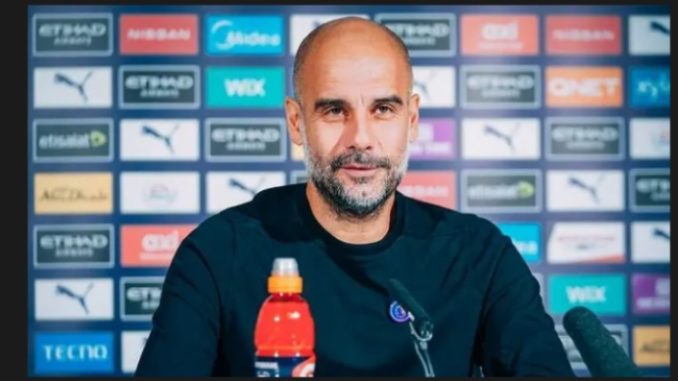
My dream is to win the world cup – Pep Guardiola
Pep Guardiola
Manchester City coach Pep Guardiola has expressed his desire to lead an international team to the World Cup trophy while revealing that he has no plans to leave the club anytime soon.
The Spaniard has won 12 League titles across Spain, Germany and England but he has never hidden his dream of managing a national team.
He has been linked with the England national team job, and also the Brazilian head coach role before Carlo Ancelotti was appointed in May.
Guardiola said: “I would love to be in a World Cup, in a Euro, a Copa America.
“I have always thought about it. But it depends on many, many things. If it happens, it’s fine. If it doesn’t happen, it’s more than fine as well.”
Guardiola guided Manchester City to a trophyless campaign for the first time since 2016, he has now revealed that he has nothing to prove next season.
He said: “It’s to prove to myself that I can do it, I don’t want to have the feeling that last season left.
“Because when we win, the wine tastes better afterwards, you sleep better. I don’t know a manager who loses games and sleeps like a baby. It doesn’t happen. You’ve got to worry. That’s part of our life.
“I won 12 domestic leagues in 16 years. It’s not bad, I would say. But you cannot win all the time. I cannot win the Champions League all the time.
“Michael Jordan, the best athlete I’ve ever seen in my life won six NBA Championships in 15 years. Tiger Woods, one incredible golf player, Jack Nicklaus, I don’t know how many he has. But they lost more Grand Slams than they won. It happens.”
Manchester City’s summer rebuild has started with the imminent signing of Wolves left-back Rayan Ait Nouri, and AC Milan’s Tijjani Reijnders.
The Cityzens will be back in action at the FIFA World Club Cup later this month to take on the likes of Wydad Casablanca, Al Ain, and Juventus in the group stage.
In the world of football, few names carry the gravitas of Pep Guardiola. A serial winner, master tactician, and footballing philosopher, Guardiola has transformed the modern game with a cerebral approach that marries art with athleticism. With league titles across Spain, Germany, and England, Champions League triumphs, and countless domestic cups to his name, one might assume there’s little left for him to achieve. Yet, in a rare moment of personal vulnerability, Guardiola recently admitted: “My dream is to win the World Cup.”
This statement is more than just a quote — it is a window into the mind of a man who is constantly chasing the next horizon. To understand its significance, we must unpack not only the legacy he has already built but also the deeper meaning behind his unfulfilled international dream.
—
Pep the Perfectionist
Guardiola’s identity as a manager is rooted in an unrelenting pursuit of perfection. At Barcelona, he revolutionized football with a tiki-taka style that prioritized positional play, intelligent pressing, and technical excellence. His influence extended beyond mere results — he reshaped how teams conceptualize space and possession.
At Bayern Munich, he adapted this philosophy to a different culture and context, emphasizing verticality and flexibility. In England, with Manchester City, he has constructed one of the most dominant domestic dynasties in Premier League history. Yet, for all his tactical ingenuity and silverware, Pep has remained on the periphery of international football since retiring as a player.
And perhaps that’s what makes his World Cup ambition so fascinating: it is one of the few stages that has eluded him not just as a coach, but as a footballing mind.
—
The World Cup: The Final Canvas
The FIFA World Cup is more than a tournament — it is a global phenomenon, a symbolic intersection of sport, culture, and national identity. Winning it requires more than tactical prowess; it demands unity, timing, and often, an element of fate. For club managers, the World Cup represents a fundamentally different challenge: limited time with players, a compressed tournament format, and fewer tactical repetitions.
For Guardiola, whose methods depend on ingrained automatisms and meticulous patterns of play, adapting to the international format would require a profound shift. Yet, that may be precisely why the challenge appeals to him. To win the World Cup would not just be a personal accomplishment — it would be proof that his philosophy transcends context.
Moreover, the international stage offers something that club football cannot: the emotional gravity of leading a nation. To take the helm of Spain — or even another footballing powerhouse — and guide it to global glory would allow Guardiola to connect his intellectual legacy with something deeply visceral. It would be the final canvas for his artistry.
—
Spain: A Natural Fit?
Much speculation surrounds whether Guardiola might someday manage Spain’s national team. As a Catalan, his relationship with Spanish national identity has always been complex, but not antagonistic. He played for the national side and captained it, and his footballing roots are undeniably Spanish.
More importantly, Spain’s existing football DNA aligns closely with Guardiola’s vision: high possession, short passing, and intelligent movement. He would inherit players already groomed in similar systems — many of whom have either played under him or been influenced by his methods indirectly. The infrastructure, philosophy, and player pool would make Spain a natural fit.
However, there are geopolitical undercurrents to consider. Guardiola has never shied away from expressing his views on Catalan independence, which makes his candidacy politically charged. Whether or not those tensions would bar him from the job remains to be seen — but from a purely footballing standpoint, few managers seem better suited to elevate La Roja once more.
—
Could Guardiola Manage Another Nation?
While Spain might be the most intuitive option, there is growing interest from other nations — Brazil being one of the most intriguing. Brazilian football is in a period of transition, seeking to combine its historical flair with modern tactical discipline. A manager like Guardiola could, theoretically, bridge that divide. He has expressed admiration for Brazilian players and has worked with many at club level.
However, taking on a foreign national team introduces cultural and linguistic challenges that even Guardiola, a polyglot and world traveler, would need to navigate carefully. National teams are as much about culture and identity as they are about tactics. Whether he could embed his methods in such a context remains a tantalizing question.
—
A Legacy Beyond the Club Game
Ultimately, Guardiola’s dream of winning the World Cup is not merely about personal glory. It represents a desire to test the universality of his ideas — to see if positional play, tactical intelligence, and creative control can triumph in a setting shaped more by chaos than consistency.
In club football, he controls nearly every variable: recruitment, training routines, long seasons that reward sustained excellence. In international football, he would be subject to constraints that could either expose or validate his methods.
Winning the World Cup would cement Guardiola’s status not just as a great club manager, but as a footballing thinker whose vision could unify a nation under a singular philosophy. It would be the culmination of a journey not just of winning, but of proving that ideas — when relentlessly refined — can outlast circumstances.
—
The Dream Remains Alive
For now, Guardiola remains entrenched at Manchester City, still chasing domestic and continental dominance. But the clock is ticking. With each passing year, the pull of international football grows stronger. The 2026 or 2030 World Cup cycles might present his last real opportunities to take on this challenge.
If and when Guardiola steps into the international arena, the footballing world will watch with more than curiosity — it will watch with expectation. Because when a man who has conquered so much still dreams of one final prize, it tells us something not just about ambition, but about the ever-expanding limits of human creativity.
—

Leave a Reply